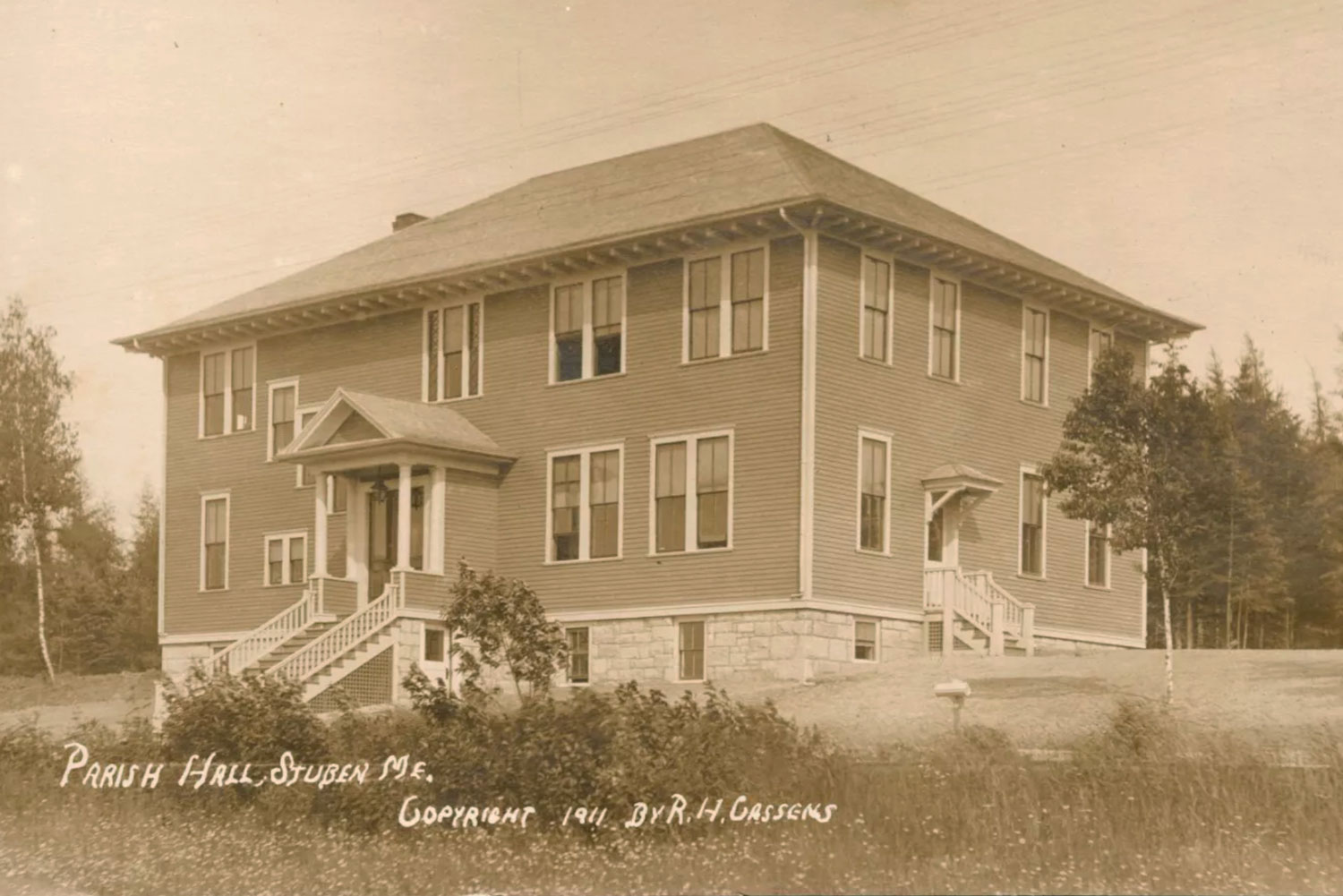000 Rogers Point Road – Henry D. Moore Library
The Parish House, 1911
From the original dedication:
Situated but a short distance from his old home is the new parish house, library and park.
The building contains a hall capable of seating two hundred, to be used for all social purposes by people, fitted with dressing, toilet rooms and kitchen, four rooms for small meetings, Sunday school classes, etc. – these rooms, together with a storeroom, gents’ coat room and pastor’s study, comprise the first floor.
The upper floor is fitted for the public library which contains 800 volumes. A large reading room is attached and two parlors especially designed for ladies’ meetings and receptions, and also a large room to be used as an amusement room for boys and young men.
The basement contains the heating plant and is fitted with bowling alley, shuffle board, etc., and has room for various ventures along gymnastic and industrial lines with an eye to the men, resident or summer visitors.
The building, as also the church nearby, is lighted by acetylene gas, and is heated by twin furnaces burning either wood or coal.
This parish house and public library is the gift of a Christian philanthropist, Henry Dyer Moore, to his old town thru the local church.
There may be many parish houses, but this new one is unique in the number of its features and the purpose of its giver to touch the whole rural problem as far as may seem feasible in the working out of the plan for the betterment of a town.
From the windows one is rewarded with a beautiful view of the river, winding its way thru the meadows, with its fringe of trees and many mountains in the distance, among them Tunk and Schoodic. From the reading room may be seen the square, monument, and church with its white spire, where the town clock, the gift of Samuel Purritt, has told the hours for 15 years or more. The cemetery and last but not least the birthplace of the donor which suggests the lines:
“How dear to the heart are the scenes of my childhood
When fond recollection present them to view;
The orchard, the meadow, the deep tangled wild wood,
And every loved spot which my infancy knew.”
In memory of her mother, Mrs. Catherine Leighton Moore, Mrs. Loring of Portland, has placed in the library, a beautiful picture of the Bridge and Fort St. Angelo at Rome, serving as an approach to St. Peter’s cathedral and the Vatican. It was constructed in A.D., 185 by Hadrian for the purpose of connecting his Mausoleum with the Campus Martius.
It is shown on the coins of Hadrian, the Castle of St. Angelo with its massive circular tower called from its founder Mole of Hadrian, surrounded with ramparts, ditches and bastions, mounted with cannon forms the citadel of Rome.
The parish house committees are: Grounds and repairs, D. C. Smith, chairman; J. V. Whitten, A. F. Smith; housekeeping, Mrs. Amanda Lewis, Mrs. Mary Dutton, Mrs. Wm. Wass, Mrs. Mary Cleaves; rules, Miss Susie Moore, Miss Vida Moore, Mrs. Dora Smith, Walter Dutton; library, Miss Vida Moore, Miss Susie Moore, Miss Ella Lewis, Miss Jeannette Leighton; executives, David Smith, Miss Vida Moore, Miss Susie Moore, Walter Dutton; librarian, Miss Susie Moore, assistant, Miss Lewis.
Henry D. Moore
The donor of the Steuben parish house, was born in Steuben sixty-eight years ago, the son of Robert and Eliza Jones Moore. He grew up in the town and at the time of the Civil war enlisted in the fall of ’63 and served two years. In 1866, he went to Hammonton, N. J., and engaged in fruit raising. Later he became a bookkeeper for a Philadelphia business house. In 1869, he was employed by Garrett & Sons of Philadelphia, with whom he remained over twenty years and eventually became the head of the firm. Several years ago he retired from active business, finding himself sufficiently employed with the management of his estate. His home is in Haddonfield, N. J., where he is surrounded by his sons and daughters. He is the proud grandfather of eighteen grandchildren.
Mr. Moore is a fine example of the sturdy enterprising sons of Maine, who have contributed to the prosperity of other commonwealths and won distinction in them. Such men are Maine’s choicest output. Like many New Englanders he is proudly loyal to his native town, and for many years the month of August has brought him back to the old home to recall early associations; to catch trout from the same old stream; to sail the same blue bay; to worship in the little village church; to acquaint himself with the life of the community and out of his generous heart to enrich that life in various ways.
The parish house, which is his latest and largest single gift to the town, is an expression of his earnest wish to provide a religious, social, and intellectual center for the entire community. It is to be administered on the
broadest lines and combines advantages which in our cities are afforded by public library, social settlements, Y. M. C. A. and Y. W. C. A. buildings. Its library and reading room, game rooms, parlors, assembly hall, and thoroughly equipped kitchen, offer abundant facilities for recreation and self-improvement which the people are quick to appreciate. It would be difficult to plan a more judicious gift to a country community than this wise-headed and large-hearted man has bestowed upon his native town, and it is hoped that other of Maine’s prosperous sons may follow his example. It is Mr. Moore’s purpose to endow the building he has erected in Steuben, thus insuring its maintenance in the future.
Miss Susie L. Moore
Librarian and caretaker in the new parish house is a cousin of the donor, Mr. Henry D. Moore, and is like him, a native of Steuben, but has spent much of her life outside the state. For some years a teacher, first in Maine, then in New Jersey, later in a mission school in South Carolina, and later still, a resident of Colorado Springs for some years, Miss Moore brings to her new work a strong personality, enriched by wide and varied experience.




